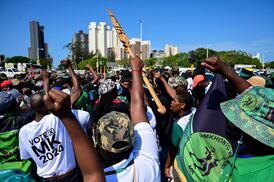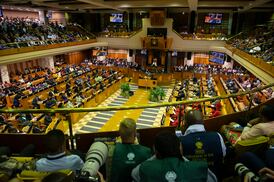The successful hosting of the 2010 Fifa World Cup — once a moment of national pride and global admiration — is now a fading memory, a distant blip in the rearview mirror of a nation grappling with crime, insecurity and a fraying social fabric. What was hailed as a turning point in South Africa’s global image and domestic unity now stands in stark contrast to the deepening sense of vulnerability that defines everyday life for many citizens.
During South Africa’s 2010 football jamboree, more than 6-million people reportedly gathered at fan parks across the country to experience the tournament in a vibrant and communal atmosphere. Notably, the Gauteng province was the central hub of World Cup activity. Then Fifa secretary-general Jérôme Valcke publicly commended South Africa’s security forces for their exemplary performance throughout the tournament. “They have done even more than what people were expecting,” Valcke remarked. “I mean, there was not a single incident — nothing that put the World Cup at risk during all 32 days.”
This reflection was prompted by a recent episode of the Sunday Times Politics Weekly podcast, where deputy editor Mike Siluma interviewed Wits University professor Firoz Cachalia, who President Cyril Ramaphosa has appointed acting minister of police with effect from August 1.
It is worth recalling that Cachalia, a constitutional law expert, previously served as Gauteng’s MEC for community safety — a portfolio that would have placed him squarely at the centre of public safety and security planning including co-ordination efforts during the World Cup. His past experience in this capacity and his laudable efforts as chair of the National Anti-Corruption Advisory Council may thus prove instructive as he takes up his new responsibilities within the national security apparatus.
However, certain remarks made by Cachalia — both in previous public engagements and in this recent interview — particularly in the wake of KwaZulu-Natal provincial commissioner Nhlanhla Mkhwanazi’s explosive revelations, raise a number.
Though well-intentioned, some of his assertions have come across as ill-considered or lacking the nuance such complex and sensitive matters demand. Given the gravity of issues like institutional dysfunction and political interference, his remarks warrant closer scrutiny — especially as they may shape public expectations and policy under his leadership of the police ministry.
There is little doubt that constitutionalism remains a central and recurring theme in Cachalia’s public commentary — a principle he invokes with consistent conviction. However, this is often accompanied by his ill-timed refrain that “giving the police a licence to kill is not the answer to [fighting] crime” and his determination to abolish the SAPS political killings task team.
Cachalia’s stance is not only redolent of a broader trend that risks stripping police officers of the necessary agency to confront brazen and often violent criminals — particularly in crime-ravaged provinces like KwaZulu-Natal — but it also appears increasingly misaligned with the prevailing public safety zeitgeist.
While his assertions — widely seen as a direct swipe at Mkhwanazi — underscore a principled commitment to the rule of law and human rights, they also invite deeper interrogation, particularly in the context of rising violent crime and public anxiety over perceived law enforcement impotence.
Slowly but steadily — and thanks to principled and resolute officers like Mkhwanazi — even the most entrenched crime kingpins and venal politicians are beginning to feel the heat
As communities call for a more effective police response to rising violence and organised crime, an overly rigid view of police conduct risks undermining both public confidence and operational effectiveness. The real challenge is balancing constitutional ideals with the harsh realities of policing in a high-risk, deeply unequal and violent society.
Mkhwanazi’s core message — that “police officers must not die with guns in their hands” — affirms that officers should not remain passive when facing armed, murderous criminals. Rather it underscores the basic expectation that, within the bounds of the constitution and the law, police are entitled to defend themselves and others against imminent threats to life and safety.
The deadly toll exacted by heavily armed criminals in these areas is beyond dispute — yet so-called constitutionalists offer no credible counter to escalating anarchy.
Meanwhile, efforts to improve policing and rebuild institutional credibility, including purging internal elements that compromise its integrity, have not gone unnoticed. Slowly but steadily — and thanks to principled and resolute officers like Mkhwanazi — even the most entrenched crime kingpins and venal politicians are beginning to feel the heat.
There is no gainsaying that the vast majority of SAPS officers are capable, dedicated professionals who risk their lives daily to protect the public and have shown, as they so admirably did in 2010, that they are capable of rising above public expectations when given the trust, leadership and resources to do so..
Against this backdrop, it is imperative that the incoming minister of police remains above the partisan fray and avoids “catching strays” that may well have contributed to his predecessors’ political undoing. At stake is not only the leadership of a critical ministry but also the broader imperative of restoring public confidence in law enforcement and reasserting the rule of law in a society increasingly besieged by violent crime and institutional fragility.
For what it’s worth, let’s make our democracy work!
• Khaas is founder and chairperson of Public Interest SA
For opinion and analysis consideration, e-mail Opinions@timeslive.co.za





Would you like to comment on this article?
Sign up (it's quick and free) or sign in now.
Please read our Comment Policy before commenting.